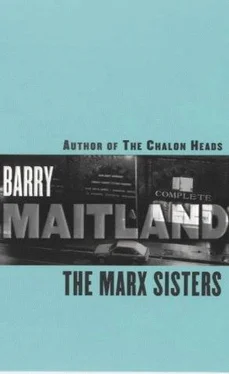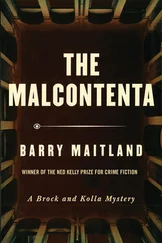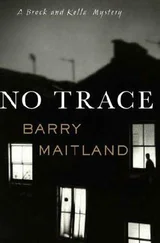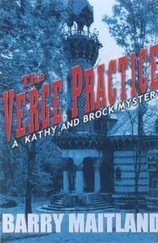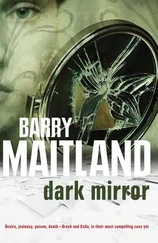Barry Maitland - The Marx Sisters
Здесь есть возможность читать онлайн «Barry Maitland - The Marx Sisters» весь текст электронной книги совершенно бесплатно (целиком полную версию без сокращений). В некоторых случаях можно слушать аудио, скачать через торрент в формате fb2 и присутствует краткое содержание. Жанр: Полицейский детектив, на английском языке. Описание произведения, (предисловие) а так же отзывы посетителей доступны на портале библиотеки ЛибКат.
- Название:The Marx Sisters
- Автор:
- Жанр:
- Год:неизвестен
- ISBN:нет данных
- Рейтинг книги:3 / 5. Голосов: 1
-
Избранное:Добавить в избранное
- Отзывы:
-
Ваша оценка:
- 60
- 1
- 2
- 3
- 4
- 5
The Marx Sisters: краткое содержание, описание и аннотация
Предлагаем к чтению аннотацию, описание, краткое содержание или предисловие (зависит от того, что написал сам автор книги «The Marx Sisters»). Если вы не нашли необходимую информацию о книге — напишите в комментариях, мы постараемся отыскать её.
The Marx Sisters — читать онлайн бесплатно полную книгу (весь текст) целиком
Ниже представлен текст книги, разбитый по страницам. Система сохранения места последней прочитанной страницы, позволяет с удобством читать онлайн бесплатно книгу «The Marx Sisters», без необходимости каждый раз заново искать на чём Вы остановились. Поставьте закладку, и сможете в любой момент перейти на страницу, на которой закончили чтение.
Интервал:
Закладка:
Jones hesitated. ‘No, not really, to tell the truth. I was pretty jaded after the competition, I suppose. But, anyway, the thought of doing a big office development for First City didn’t fill me with much enthusiasm. They’re a solid company, but their work is very run-of-the-mill. Dead dull, actually. I quite like Slade, and in many ways he’s an ideal client-he’s straightforward and pays his bills on time. It’s just that he’s not interested in architecture. If you try to talk about it, you get the feeling he’s indulging you. Which is a bit sad for someone putting up buildings all over the place.
‘Anyway, Slade then said that he didn’t want us to wait, he wanted us to start work designing the buildings straight away, which knocked Herbert off his perch a bit. “How can we, Derek, if we don’t know where they’re going to go?” he said, which seemed to me a pretty reasonable question. “Why not?” Slade came back at him. “People design cars and ships and aeroplanes that way all the time, don’t they?” ’
Bob Jones laughed and shook his head as he remembered.
‘It was preposterous, but he meant it. He opened his briefcase and produced a drawing which his surveyors had prepared, of the outline of the site. It was really nothing more than a rough rectangle, about ninety metres in one direction and a hundred and twenty in the other. In one corner was a tube station, which he said would give an opportunity for some underground specialty shopping levels. The predominant use was to be commercial offices, about a million square feet in all, mostly in central core towers preferably, with net floor areas of ten thousand square feet per level. He didn’t want any housing of course, but he could accept a small amount of non-commercial space as a sop to the planners if there was some convenient corner for it.
‘The words “a million square feet” did something to Herbert’s synapses, and he went quiet at this point, so I chipped in that it really would be impossible to do anything worthwhile without more information. Buildings aren’t like ships and planes, they’re rooted to the spot, they impact on one specific place, they sit alongside, overlook, cast shadows on, generate traffic around, a specific set of neighbours. To tell the truth, I still wondered if he was pulling our legs, but he was studying his fingernails in that very patient way he has, so I tried again. I explained we had to consider the context of our buildings right from the first concept stage as much as later on in the details. They have to take their place in their streets in a civilized way. Apart from anything else, the planners would insist on it.
‘Slade let me finish, then let silence fall. I’d seen him do this before. It’s his most reliable and effective technique, to let the opposition talk itself out, show its arguments, run out of steam, and then to wait for a moment in tense silence before he finally utters his verdict.
‘“The site is in central London, Bob,” he said at last. “You know central London. The present buildings on the site are all rubbish, with the possible exception of a small synagogue which I’m currently getting heritage advice on. The surrounding buildings are a mixed, undistinguished lot. You design your ideal solution to the brief I’ve just outlined for you-God knows it’s loose enough, I should have thought. I always thought you architects were begging for a chance like this, with so few constraints. However, if you feel you can’t do it…”
‘That was the clincher, of course. Herbert practically jumped out of his seat. Of course we could do it! He loved the analogy to a ship! And, after all, the new project would establish a new scale and indeed language for the whole neighbourhood.
‘So we agreed I’d prepare sketch drawings showing three alternative design approaches for another meeting two weeks later.’
Jones shifted uneasily in his seat. ‘I’m getting a bit cold,’ he said. ‘How about you? It’s the air-conditioning in here. Always gets it wrong.’ He got to his feet and fiddled with a thermostat on the wall. Kathy and Brock watched him, saying nothing as they waited for him to settle again.
‘I didn’t feel any happier at the end of the two weeks. It was clear they were trying to get a very intensive level of development on the site. A million square feet on that area would give a plot ratio in excess of ten to one, which was more like Manhattan than London. The idea of trying to fit that amount of building in without any idea of what lay around it was just ludicrous, and I didn’t really take it seriously. I went through the motions, though, and Slade seemed pleased enough when we met the second time. He brought his agent, Quentin Gilroy, with him, which is always a sign he’s getting serious. They agreed I should develop the ideas a bit further and we’d meet again in another couple of weeks. But he still wouldn’t tell me any more about the location.
‘Well, I was finding this a bit hard to take. And when I thought about it, I realized it really wouldn’t be too hard to find a central London synagogue that was on the list of buildings of historic or architectural interest, and that was also in the same city block as an Underground station. It took me a couple of hours to trace it, and on the way home that evening I paid my first visit to Jerusalem Lane.
‘My first reaction was one of relief. There really wasn’t any strong architectural character to the surrounding streets, and the buildings within the block were a mixed bag of structures that seemed to range from scruffy to downright dangerous. I didn’t think the synagogue would be any great loss, and on the whole I was inclined to think that wholesale redevelopment would be the best option, although the Lane itself intrigued me-it was such an odd thing.
‘A couple of days later I went back at lunchtime for another look. I sat in the Balaton Cafe, looking out into the Lane. There were two old men in the cafe having an argument about whether it was Chopin or Liszt who was kissed by Beethoven-apparently it was Liszt. Then that rather formidable woman who runs the flower shop on the other side of that little square in the centre of the Lane came over and they had a discussion with her about whether she could find them a black rose for some anniversary that was coming up. Other people called in, taking up conversations with each other they must have started the day before, or maybe twenty years before in some cases. And gradually I began to get an idea of what an extraordinary crowd they were. There was a doctor, I remember, an odd-looking bloke-at least, I assume he was a doctor, because he practically set up surgery in the corner table. People would wander over and show him something and he’d shove his soup to one side and pull out his pad and give them a prescription!’
Jones laughed. ‘Do you know them? Do you know what I mean?’ And Kathy smiled, recognizing them immediately from his description.
‘After lunch I had a closer look at the buildings along the Lane. They were every bit as eccentric as the people who lived in them really, but it was interesting how, in their arrangement, how they all fitted together to form this compact little place right in the middle of the city-part of the city, but also private and protected. And what went on inside the buildings was so varied too, little businesses that had probably been running on a shoestring for years all mixed up with flats and offices and a couple of small workshops.’
Kathy nodded, responding to the enthusiasm which lit up his face. Then abruptly it passed and he frowned.
‘When I got back to the office and saw again the drawings I’d made, I began to feel very uneasy. The existing buildings might be inconvenient, impossible to modernize, an underdevelopment of a prime site. But to replace them with acres of dead standard office floors seemed somehow obscene. Talk about monoculture! After a couple of hours in the real Jerusalem Lane, the idea of trying to breathe life into those dead drawings seemed just hopeless.’
Читать дальшеИнтервал:
Закладка:
Похожие книги на «The Marx Sisters»
Представляем Вашему вниманию похожие книги на «The Marx Sisters» списком для выбора. Мы отобрали схожую по названию и смыслу литературу в надежде предоставить читателям больше вариантов отыскать новые, интересные, ещё непрочитанные произведения.
Обсуждение, отзывы о книге «The Marx Sisters» и просто собственные мнения читателей. Оставьте ваши комментарии, напишите, что Вы думаете о произведении, его смысле или главных героях. Укажите что конкретно понравилось, а что нет, и почему Вы так считаете.
